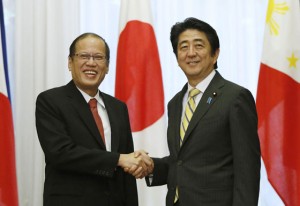GIVEN the “severe” regional situation arising from maritime disputes, Japan and the Philippines are looking at strengthening their security cooperation by invoking the “right of collective self-defense” in their territorial disputes with China.
In a joint press statement after their meeting on Tuesday, President Benigno Aquino 3rd and Prime Minister Shinzo Abe said the Philippines and Japan are discussing the right of collective self defense along with other approaches to peace.
“In the face of the regional situation becoming increasingly severe, both nations are closely coordinating. I reaffirmed with President Aquino today the significance of the three principles of the rule of law, which I outlined at the Shangri-la dialogue and at the G7 meeting,” Abe said.
“I explained to the President about the approaches we are taking under the policy of proactive contribution to peace, namely the drawing up of the three principles for the transfer of defense equipment and the studies which are underway on relationship between the right of collective self-defense and the Constitution,” he added
Japan and the Philippines agreed to strengthen security ties in the face of China’s military expansion and territorial disputes in the South and East China seas.
Rule of law
Japan and the Philippines also jointly stressed the need to use “the rule of law” to solve regional disputes.
The comments highlight how regional neighbors are forging alliances to counter an increasingly muscular Beijing as it presses its influence in nearby waters.
Tokyo and Manila, former World War II enemies, had been drawn closer in recent years as they tackled their parallel disputes with China.
Aquino said his visit to Japan was focused on “the challenge of safeguarding our regional security by advancing the rule of law to protect our global and regional common interests.”
Abe has repeatedly called for the rule of law to be upheld in the region as tensions simmer over territorial disputes, involving China and some Southeast Asian states around the South China Sea as well as between Tokyo and Beijing in the East China Sea.
Beijing claims almost all of the West Philippine Sea (South China Sea), even waters approaching the shores of neighboring countries, and has become more aggressive in enforcing what it says are its historical rights.
The Philippines has lodged repeated protests over China’s growing military and civilian presence on islands and in waters within what it considers its exclusive economic zone.
Meanwhile, relations between Japan and China have plummeted over their competing claims to the Japanese-controlled Senkaku islands in the East China Sea.
Aside from security cooperation, the two leaders also agreed to boost economic relations so that the two countries may grow together.
Abe told Aquino that Japan is relaxing the visa requirement for Filipinos and hoped many tourists from the Southeast Asia country could visit Japan.
“I convey to the President that we could continue to support approaches taken by the Philippines in urban infrastructure improvement and other areas,” he said.
The two leaders agreed to further strengthen their cooperation in areas such as disaster relief.
“When the Philippines suffered the scourge of the typhoon last autumn, Japan did the utmost possibility to extend cooperation including the dispatch of our self-defense forces. The scale of which was unprecedented. I was very encouraged to hear from the President about the strong resilience with which reconstruction is taking place,” he said.
President Aquino, for his part, thanked his host and the Japanese government, saying he looks forward as well towards revitalizing the strategic partnership between their two countries.
“Prime Minister Abe and I likewise shared the view that prosperity and development cannot exist in a vacuum; that the advancement of our peoples and our region can only be fully realized in a context that fosters stability,” Aquino said.
“Japan is a strategic partner of the Philippines; it is thus incumbent upon us to have continuous dialogue as we jointly face the changing dynamics of our regional security environment,” he added.
Aquino likewise expressed his support for Abe’s proposal to revisit the Japanese constitution “if this enhances Japan’s ability to address its international obligations, and brings us closer to the attainment of our shared goals of peace, stability, and mutual prosperity.”
AFP


